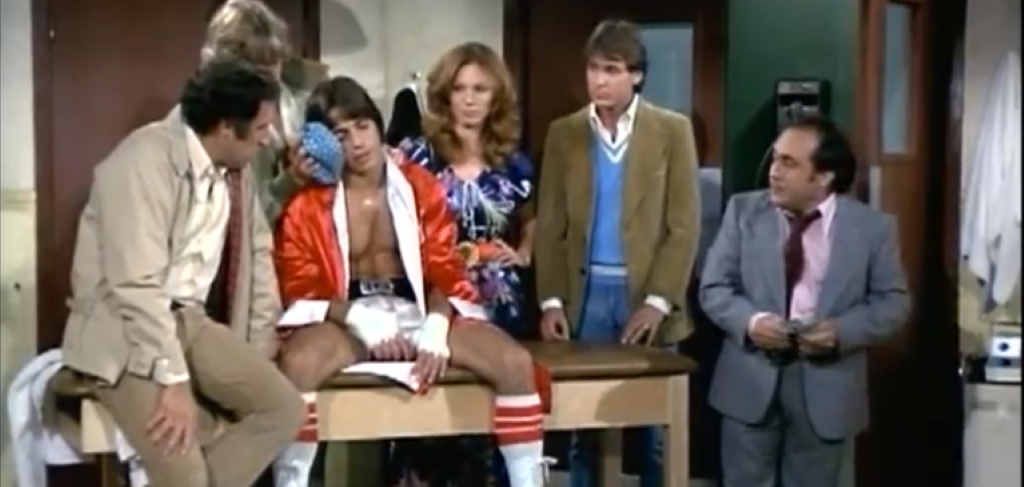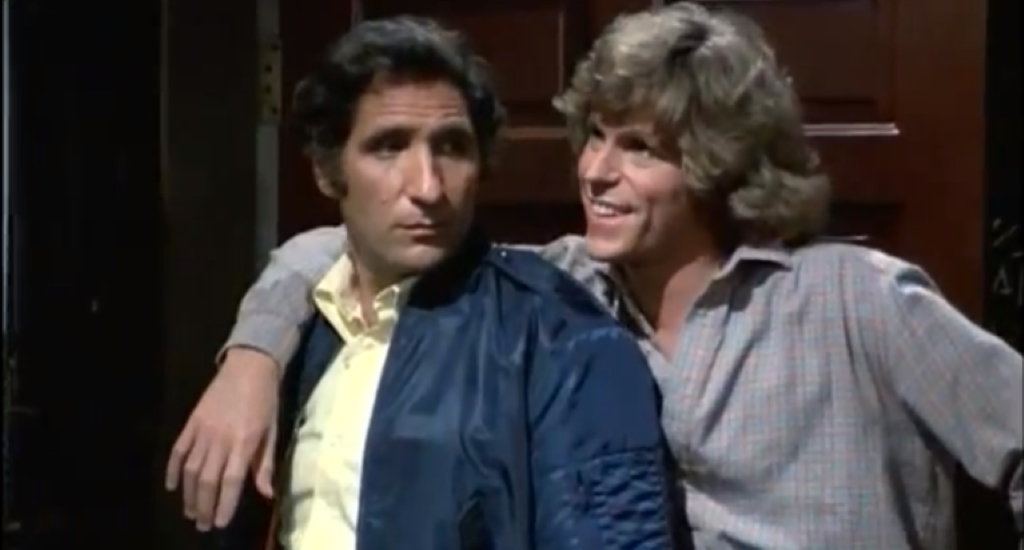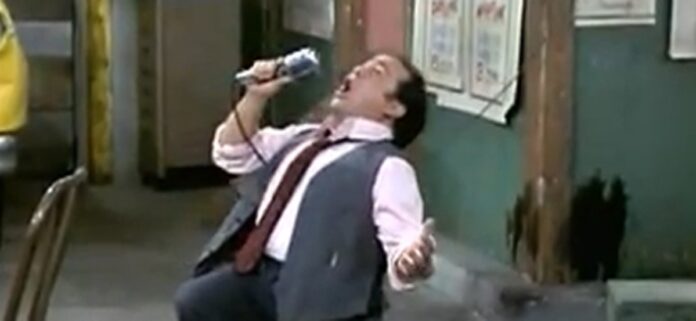Season 1, Episode 2: “One-Punch Banta”
Original Airdate: Sept. 19, 1978
Summary: Tony receives the chance to serve as a sparring partner for a middleweight boxing champion, but he might encounter unexpected challenges.
Naveen: We’ve moved past Taxi’s pilot episode, and now we’re entering the phase where most sitcoms experience some growing pains.
It typically takes a few episodes for a show to define its identity, highlighting what works and what doesn’t. While the pilot centered around Alex and the isolation that comes with being a long-time cab company employee, the episode “One-Punch Banta” shifts its focus to one of the other cab drivers, Tony, who aspires to achieve something meaningful in his life.
For Tony, this means pursuing his professional boxing dreams, including a sparring session with Carlos Palomino (making a cameo appearance as himself). However, things don’t unfold as he initially anticipated.
What stood out to me in this episode is the camaraderie among the cabbies and their genuine desire to support each other.
Alex, Bobby, and Elaine attend Tony’s sparring match and contribute to getting him a boxing robe to replace his usual towels.
Alex takes action by making a financial bet with Louie, and when things don’t go as planned, they quickly rally behind Tony when he expresses his determination to try again.
This sense of unity and mutual support reminds me of Michael Scott’s belief in The Office that your colleagues become like family.
While the cabbies may not explicitly think of each other as family, there’s a strong underlying bond among them.
*One of my favorite moments in the episode is when Alex reveals the card with the names of those who didn’t contribute. It’s not surprising that Louie’s name is at the top of that list.
I’m both encouraged and touched by the situation.
It’s bittersweet because they understand that if Tony succeeds and achieves his big break, he’ll leave their world behind.
While they may stay in contact and support him in his fights, it gives the impression that there’s a clear division between being part of or separate from the Sunshine Cab Company’s world.
In contrast to the pilot episode, Danny DeVito played a significantly larger role this time.
Unlike the previous episode, where he appeared somewhat isolated, now he actively engages with the world of the cabbies, albeit with a touch of sarcasm, as he teases their aspirations and takes their money.
Remarkably, his behavior aligns with the good-natured, blue-collar banter the cabbies exchange among themselves.
It doesn’t come off as malicious; instead, it reflects his general sharp wit, as pointed out by Alex when he humorously states, “You’ll have to forgive Louie, he’s himself today.”
The writers recognized DeVito’s versatility as an actor and his inherent likability as a person.
This allows them to portray him as a complete jerk, a portrayal that, in the context of contemporary television, echoes the character Frank Reynolds in “It’s Always Sunny in Philadelphia.”
And if they ever feel they’ve pushed the limits too far, they can balance it with a cheerful Broadway performance in the empty garage.
“What stood out as the highlight this week was his memorable line: ‘I believe it’s the spray cans, the world’s going crazy!'”

Astha: You’re correct, Naveen. This episode primarily revolves around Tony, but it’s undeniably Louie’s spotlight.
The initial sequence provides a glimpse into a typical day in the life of Louie DePalma, characterized by his systematic mistreatment of everyone he encounters.
It serves as an appetizer of comedic malevolence.
This week, Louie and Alex firmly establish themselves as the contrasting moral pillars within the Sunshine Cab Company.
While we delve into Tony’s backstory, it becomes evident that his storyline is just the latest battleground for their ongoing rivalry.
When Alex asserts that the other cabbies would willingly sacrifice their most profitable night of the week to provide moral support to one of their own, a genuine sense of tension arises, leaving us in suspense regarding whether Alex or Louie’s perspective will prevail.
Both potential outcomes offer a chance for humor, and in selecting which side to align with, the show early on conveys its stance on human nature.
This scenario notably evoked parallels to the climactic confrontation between Batman and The Joker in “The Dark Knight,” posing the fundamental question of whether people will opt for selfless sacrifice or cynical self-interest.
This episode also intriguingly contributes to the development of Elaine’s character.
Notably, she humorously makes several remarks about her bedroom skills, which are presented in a non-smarmy or degrading manner.
Elaine is establishing herself as a sexually liberated woman unapologetically, and the show expects the audience to embrace this attitude.
It’s a confident move that challenges traditional “slut” stereotypes often seen in sitcoms today.
Shifting to the showdown between Tony and The Champ, I found that Palomino, the real-life welterweight champion at the time, handled his limited acting role quite capably.
On the other side of the ring, it’s not surprising that Danza managed the boxing sequences comfortably, given his background as a professional boxer discovered at the gym before joining the cast of Taxi.
Sidant: “One-Punch Banta” both succeeds and falls short for the same reason: it doesn’t merely replicate the pilot episode as a makeshift copy.
Crafting second episodes can be particularly challenging, as it’s rare to find one that stands out as “great.”
Often, creators follow the formula of the first episode with minor variations.
This episode, however, deviates from that approach and avoids the repetitive pattern we’ve become accustomed to.
Earl Pomerantz’s script is more scattered, perhaps even funnier, and gets the crew out of the garage earlier.
Shifting the primary focus from Alex to Tony (as astutely pointed out by some of you) is the most evident difference in this episode.
Furthermore, it has a distinct tonal quality. While there’s less emotional depth on display, or at least it doesn’t manifest through Alex’s heartfelt and awkward speeches, Tony and Louie are portrayed as less soulful but better suited for creating significant comedic moments.
This results in a stronger comedic episode. Danza portrays the dense goofball character with genuine charm, and DeVito has already embraced Louie’s irritable persona by the second episode.
“Taxi’s ‘One-Punch’ episode demonstrates its versatility. While the pilot focused on character-based comedy, episode two takes on a broader and goofier tone, which is a positive change.
However, it’s worth noting that this episode makes some leaps that a more repetitive second episode could have smoothed over.
The chemistry and dynamics among the characters were well-established in the pilot, but it feels like there are missing conversations between Elaine and the rest of the group.
In the pilot, Elaine wasn’t given much of an introduction, but here, she’s already fully integrated into the group.
On one hand, there’s no need to see multiple episodes of Elaine in tension with the guys just because she’s new and a woman.
On the other hand, the shorthand the characters now have with each other was developed off-screen, which is somewhat disappointing.
I still prefer this episode over one that merely rehashes the pilot, but it’s curious that Elaine, as the new addition, has had relatively little involvement.
*I’m aware that Elaine will have her moment in the spotlight in episode five, but it’s still worth noting.”
Nirajan: Daglas, you’ve foiled my plan to kick off with the fact that Danza was a boxer before becoming an actor. Sigh.
You’ve all discussed how DeVito steals the spotlight in this episode, demonstrating that Louie isn’t all bad (he acts that way to maintain control).
You’ve also touched on Elaine’s character, which seems to be only partially developed and mostly off-screen. But what about John?
I’m perplexed by John’s role. I feel like I understand everyone else better, even Elaine.
Is he a straight man? Is he just there for decoration? He’s present in “Bobby’s Acting Career,” but his presence seems somewhat disconnected.
It’s unusual to have a character floating around in a show that otherwise feels quite confident, even in this second episode. (I’m aware that John gets written out at the end of this season, but I’m surprised it took that long.)
For me, the standout moment in the episode was the beautiful tracking shot that introduced us to the gym.
It lasts just over 30 seconds, beginning with a boxer working the speed bag and ending as Elaine starts jumping rope behind the fighter.
It was a pleasantly surprising cinematic touch in a multi-camera setup.
Season 1, Episode 4: “Bobby’s Acting Career”
Original Airdate: Sept. 19, 1978
Synopsis: With a self-imposed three-year deadline to make it in the acting industry, Bobby embarks on a frantic audition marathon in the final hours before his cutoff.
Naveen: Once again, this episode centers on one of the cab drivers striving for success in show business, particularly Bobby Wheeler.
However, the tone is more melancholy compared to “One-Punch Banta” because Bobby has set a self-imposed deadline.
None of the cab company’s members initially aimed for more than a part-time job. Even Alex, who often boasts about being “the only cab driver in this place,” seems to have landed there out of apathy.
The prospect of transitioning to full-time work is disheartening. As someone who has grappled with the challenges of pursuing a writing career, the fear of not achieving one’s dreams and settling is daunting.
As a result, the episode carries a sense of desperation as Bobby tirelessly pursues opportunities, although his slightly dimwitted nature keeps it from becoming too somber.
The early moments at the party provide comic relief, including Latka’s incomprehensible toast, the absurdity of Bobby’s celebration when there’s nothing specific to celebrate, and Alex’s bewildered reaction.
Even when the big break doesn’t materialize, Bobby finds comfort in his friends and decides to extend his deadline by three more years.
How did you react to Bobby’s more emotional moments when he confronted Alex for not supporting him?
In a comedy, Bobby’s heightened emotions, compared to his usual demeanor, may have hinted at a twist in his routine, but this didn’t diminish the emotion conveyed by Jeff Conaway or the cathartic relief when he embraces Alex.
Although Alex jests, “You bastard,” it’s evident he was genuinely affected by the confrontation.
The episode’s B-plot provides welcome comedic relief and offers insight into one of the cabs, demonstrating how this eclectic group comes together.
Alex’s innate kindness leads him to rescue the dog Hamlet from its abusive owner, and everyone in the garage rallies around Alex’s desire to keep the dog, even persuading Louie with a dollar.
Hopefully, this will turn into a beloved garage dog, as demonstrated in shows like Cougar Town, where a lovable, oversized dog enhances the storyline.

Astha: The contrast with the previous episode becomes evident, and the difference in Alex’s reactions is even more pronounced.
With Tony, he vocally and wholeheartedly supports him, even being willing to sacrifice a C-note to boost the guy’s confidence.
In this case, he adopts a tougher, tough-love approach as a counterbalance to Bobby’s frenzy and semi-denial.
Once again, we gain insights not only into the episode’s central character but also into Alex himself.
He serves as a mentor to these quirky colleagues, demonstrating his astuteness in understanding that different individuals require distinct methods.
One of my preferred examples of how others perceive Alex harks back to a joke in “One-Punch Banta”: Bobby consistently lies about his earnings to Tony, but when Alex inquires, Bobby instinctively tells the truth.
Viewing these two episodes consecutively provides a glimpse of the underlying melancholy in Taxi, which deviates from typical sitcom patterns.
These characters find themselves in a place they’d rather not be, a stepping stone to a better life that, from an external perspective, appears unattainable.
While they seek escape, they find consolation in their shared disappointment.
However, this kind of solace is temporary; it bolsters you for a while but also erodes your spirit. In many ways, Taxi shares similarities with the Community.
Sidant: The first few Taxi episodes stand out for providing each character with their spotlight, creating the feeling of having half a dozen pilot episodes bundled under the Taxi franchise.
This approach enables us to swiftly grasp the essence of these individuals and, more crucially, understand their aspirations in life.
What I admire is the show’s dedication to depicting the characters actively pursuing their dreams instead of just informing us each week that Tony is a boxer or Bobby aspires to be an actor.
While these “dream” professions are ripe for humor, something Taxi readily embraces, offering the audience a chance to witness the characters genuinely striving to achieve their goals adds a special touch.
In these two episodes, we observe that Tony lacks the skill to box professionally, and Bobby grapples with his acting career, indicating they won’t be departing from the garage anytime soon.
Nevertheless, their displayed talent convinces us that they will eventually move on to greater things. Onward and upward, and so it goes.
The comparison to “Community” is strikingly appropriate (and one I expect we’ll revisit due to our shared fondness for that show).
The garage bears a resemblance to Greendale in its role as a transitional stage for these individuals, as Astha pointed out.
They all have aspirations beyond the garage, whether it’s in boxing, acting, art, or family, but for now, they rely on this place and these people to get by.
So, one could argue that Alex takes on a role similar to Winger, and this becomes evident after a few episodes.
Moreover, “Bobby’s Acting Career” exemplifies the show’s ability to seamlessly shift tones, stakes, and depth from one episode to another without any difficulty.
I can confidently declare that this is my favorite episode among the first six or seven, primarily because it delves into the show’s darker aspects, akin to the pilot but slightly improved.
Despite Jeff Conaway’s well-known appearances on “Celebrity Rehab,” he delivers an exceptional performance as Bobby Wheeler.
Bobby could easily come across as dim-witted and intellectually challenged like Tony if it weren’t for the genuine humanity that Conaway instills in the character.
From a technical standpoint, I appreciate how Taxi and James Burrows infuse dynamism into relatively static environments.
These characters exhibit more mobility than even those in contemporary multi-camera sitcoms.
While a boxing match naturally facilitates such movement, the celebratory party in Bobby’s apartment in this episode also exudes a vibrant energy.
Nirajan: I caught on to Bobby’s speech quite rapidly, Nilesh, but I wasn’t entirely convinced because the show had already incorporated a significant emotional moment in the pilot.
When he forcefully opened the door in a burst of mock rage and disappointment, I began to doubt my initial assessment.
Sidant highlights the joy of witnessing dreams come to life, and I was pleasantly surprised to discover that Bobby is, in fact, a highly skilled actor who has had a string of bad luck.
Considering his seemingly simple-minded demeanor, I had concerns that he might resemble another Joey Tribbiani: someone with good looks but lacking in skill or intelligence.
To the episode’s credit, it intentionally amplifies this perception during the commercial audition, as previously mentioned with the line, “I better go rehearse that.”
This deliberate portrayal only heightens the tension in his emotional outburst towards Alex, making it feel like the situation could take a more serious and unpredictable turn.
Much like Astha Kaufman, I’ve grown somewhat weary of Latka and his comedic routine.
I generally don’t find foreign characters to be especially humorous, and even though the show avoids resorting to specific stereotypes, it still comes across as somewhat absurd. In my view, Latka doesn’t quite fit into the show at this point.


